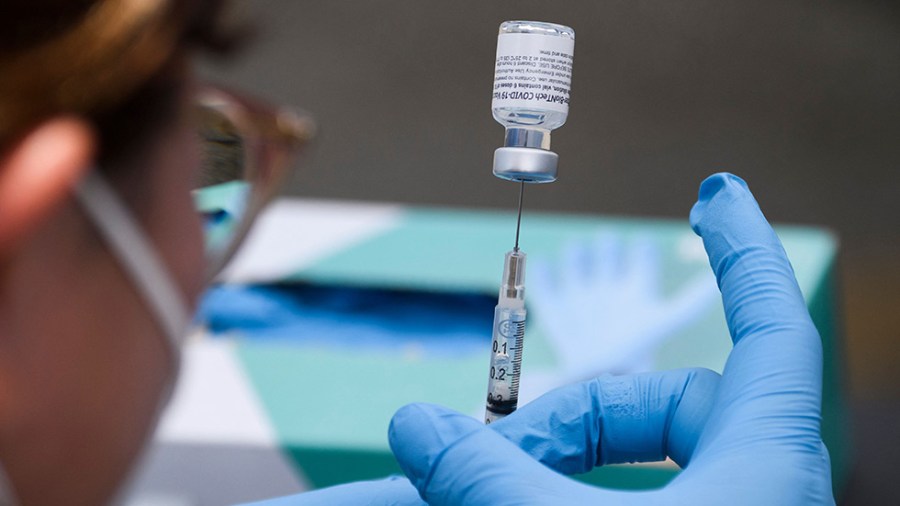Overnight Health Care — Presented by Indivior —Pfizer: COVID-19 vaccine safe for young kids

Welcome to Monday’s Overnight Health Care, where we’re following the latest moves on policy and news affecting your health. Subscribe here: digital-stage.thehill.com/newsletter-signup.
Ben & Jerry’s has created a new flavor to support Rep. Cori Bush’s (D-Mo.) public safety bill introduced in June. The flavor called “Change is Brewing” features cold brew coffee ice cream with marshmallow swirls and fudge brownies.
Pfizer said its COVID-19 vaccine was safe and effective in children between the ages of 5 and 11, the next group that needs to be vaccinated. The company said it plans to file for FDA authorization by the end of the month.
For The Hill, we’re Peter Sullivan (psullivan@digital-stage.thehill.com), Nathaniel Weixel (nweixel@digital-stage.thehill.com) and Justine Coleman (jcoleman@digital-stage.thehill.com). Write to us with tips and feedback, and follow us on Twitter: @PeterSullivan4, @NateWeixel and @JustineColeman8.
Let’s get started.
Pfizer says its COVID-19 vaccine is safe and effective in younger kids

Pfizer and its partner BioNTech on Monday said they will soon file for Food and Drug Administration (FDA) authorization after a clinical trial found their COVID-19 vaccine was “safe” and “well tolerated” by children ages 5 to 11, and “robust neutralizing antibody responses” were observed.
For its trial, the companies used a much smaller dose than what is given to people age 12 and older. Instead of giving two 30 microgram doses three weeks apart they used 10 microgram doses in the younger children.
“Since July, pediatric cases of COVID-19 have risen by about 240 percent in the U.S. – underscoring the public health need for vaccination. These trial results provide a strong foundation for seeking authorization of our vaccine for children 5 to 11 years old, and we plan to submit them to the [Food and Drug Administration (FDA)] and other regulators with urgency,” Pfizer CEO Albert Bourla said.
Pfizer’s trial included 2,268 participants between the ages of 5 and 11. According to the company, the doses resulted in side effects comparable to what was observed among the trial for patients ages 16 to 25.
Many questions: Pfizer did not give much information. There were statements, but the company did not show the data to back up the assertions. There was no information about efficacy or specific side effects, meaning it’s unclear just how well children are protected. We don’t know if it prevents infections as well as hospitalizations, or at what levels.
But still encouraging: While there were complaints about “science by press release,” the announcement is likely encouraging for parents concerned about their unvaccinated children. Some experts also noted that regulators are likely going to have to make a decision based on limited data. Young children were not as impacted by the alpha variant, but as the delta variant spread, pediatric hospitalizations rose sharply. Scientists don’t know the full safety profile yet, but it’s not likely that a large enough clinical trial could be completed quickly enough given the public health urgency.
White House to relax travel restrictions for vaccinated international visitors

The Biden administration on Monday said it plans to ease restrictions on fully vaccinated international visitors beginning in early November.
All foreign visitors must be vaccinated against COVID-19, and must show proof of vaccination before boarding a U.S.-bound airline, White House coronavirus coordinator Jeff Zients said. He added that travelers must also provide a negative test taken no more than 72 hours prior to departure.
There will be no quarantine requirement, but Zients said there will be enhanced contact tracing, and masks will continue to be required on flights. Unvaccinated Americans will need to provide a negative test within one day of departure, and then test again when they arrive.
Currently, travel bans are in place based on specific regions, regardless of an individual’s vaccination status.
The administration will leave it up to the Centers for Disease Control and Prevention (CDC) to determine which vaccines qualify, and the definition of “fully vaccinated.” CDC will also need to determine if there will be any exemptions, aside from children too young to be vaccinated.
Why now: Zients said the protocols will “protect Americans here at home, and enhance the safety of the international air travel system.” The new policy is possible because of the rising vaccination rates in other countries, he added.
“Today nearly 6 billion shots have been administered globally and dozens of countries have strong vaccination rates,” he said.
The announcement comes ahead of a White House global summit on COVID-19 vaccines, scheduled for Wednesday. The U.S. and other wealthy nations have been accused of hoarding doses and limiting international access with policies like proprietary agreements with drug companies. The U.S. is also facing criticism for pushing ahead with a plan to provide booster doses of the vaccine for all Americans, despite uncertain evidence of their effectiveness.
Significance: The announcement represents a major victory for the travel industry and for European governments who had been pushing for a change.
The Biden administration has kept strict bans on nonessential travel from overseas, even as other countries have opened up their borders to fully vaccinated Americans.
But still: Even as the administration announced the policy change, Zients said the land border with Canada would remain closed for at least another month.
A MESSAGE FROM INDIVIOR

It’s time to rethink opioid addiction. Let’s focus on ending the stigma around opioid use disorder and removing barriers to treatment for vulnerable populations.
Sad milestone: US COVID-19 death toll surpasses that of 1918 pandemic

The U.S. death toll from COVID-19 has surpassed that of the 1918 flu pandemic, according to a tracker from Johns Hopkins University, highlighting the extraordinary damage incurred by the current virus.
The U.S. has passed 675,000 deaths, the estimated toll from the 1918 pandemic, which for a century had been the worst pandemic to hit the country.
“The number of reported deaths from Covid in the US will surpass the toll of the 1918 flu pandemic this month,” Tom Frieden, the former head of the Centers for Disease Control and Prevention, tweeted earlier this month. “We cannot become hardened to the continuing, and largely preventable, tragedy.”
Deaths from COVID-19 are also far from over. The U.S. is averaging about 2,000 more deaths from the virus every day, according to a New York Times tracker.
Caveat: The U.S. population was far smaller a century ago, meaning that the death rate from the 1918 pandemic is still higher than for COVID-19.
Thomas Ewing, a Virginia Tech history professor, wrote in Health Affairs earlier this year that the death rate from the 1918 pandemic was about six in every 1,000 people, given the U.S. population at the time of around 100 million.
The death rate from COVID-19 in the U.S. is about 2 in every 1,000 people.
SUPREME COURT TO HEAR MISSISSIPPI’S ABORTION BAN CASE IN DECEMBER
The Supreme Court announced Monday it will hear arguments Dec. 1 on a Mississippi abortion restriction that poses a direct challenge to the landmark 1973 ruling in Roe v. Wade.
Oral arguments will take place just a few months after the court’s recent move to allow Texas’s six-week abortion ban to take effect, a ruling that left abortion opponents hopeful about their prospects in the upcoming dispute over Mississippi’s 15-week ban.
The court agreed in May to take up the dispute, but anticipation over the case’s timeline has grown exponentially after the court’s Texas ruling signaled a likelihood that the justices could more formally curtail abortion rights when they decide the Mississippi case, with a decision expected by late June.
Challengers to Mississippi’s 15-week abortion ban say that it should be invalidated under Roe v. Wade, which recognized a constitutional right to abortion before a fetus is viable, typically around 24 weeks of pregnancy.
The challengers, a coalition of abortion providers and advocates, won in the lower courts. In 2019, the U.S. Court of Appeals for the 5th Circuit ruled Mississippi’s restriction unconstitutional, prompting the state to appeal to the Supreme Court.
RELATED: WHITE HOUSE ENDORSES BILL GUARANTEEING ABORTION ACCESS
The White House on Monday endorsed legislation that would guarantee abortion access in response to the restrictive Texas law that bans most abortions in the state.
The Women’s Health Protection Act would statutorily protect a person’s ability to seek an abortion and for health care providers to provide abortion services. The White House previously would not support the bill, saying it was looking into options to codify Roe v. Wade.
“In the wake of Texas’ unprecedented attack, it has never been more important to codify this constitutional right and to strengthen health care access for all women, regardless of where they live,” according to a statement of administration policy from the Office of Management and Budget (OMB).
The House Rules Committee is taking up the legislation from Rep. Judy Chu (D-Calif.) on Monday. It faces an uphill battle in the Senate, where Republicans would likely filibuster it.
The Senate companion to the House bill has the support of 48 Democrats, but two Democrats, Sens. Joe Manchin (W.Va.) and Bob Casey (Pa.), have not signed on as co-sponsors.
A MESSAGE FROM INDIVIOR

It’s time to rethink opioid addiction. Let’s focus on ending the stigma around opioid use disorder and removing barriers to treatment for vulnerable populations.
WHAT WE’RE READING
- Doctors left to decide who gets extra Covid-19 vaccines amid booster debate (The Wall Street Journal)
- Winter is coming, again: What to expect from Covid-19 as the season looms (Stat)
- States bracing for confusion about coronavirus booster rollout (The Washington Post)
- Six rules that will define our second pandemic winter (The Atlantic)
STATE BY STATE
- Louisiana health care workers struggle with strain of COVID-19, hurricane recovery (Louisiana Illuminator)
- Hundreds of COVID-19 Texas school cases were missing from state data. Here’s why (The Dallas Morning News)
- As covid-19 patients fill hospitals, health-care workers fight fear and exhaustion: ‘Here we go again’ (The Washington Post)
OP-EDS IN THE HILL
- Here’s why Biden’s vaccine mandate for private employers is a horrible idea
- Americans who refuse vaccinations are costing US big bucks as well as lives
- A lesson in what not to do: School openings in Tennessee
- No free lunch for an individual’s freedom to choose
That’s it for today, thanks for reading. Check out The Hill’s healthcare page for the latest news and coverage. See you Tuesday.
{mosads}
Copyright 2023 Nexstar Media Inc. All rights reserved. This material may not be published, broadcast, rewritten, or redistributed. Regular the hill posts







